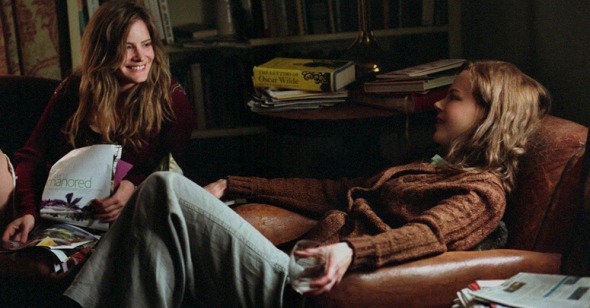Mean Girls
by Michael Joshua Rowin
Margot at the Wedding
Dir. Noah Baumbach, U.S., Focus Features
It’s with great disappointment I report that Margot at the Wedding, Noah Baumbach's follow-up dramedy, is not only nowhere near as sharp as its predecessor, The Squid and the Whale, but also a failure in its own right. Leaving behind Squid’s relatable adolescent's-eye view on divorce for a hackneyed, adult-oriented dysfunctional family dynamic, and replacing Squid’s modest realism for incongruent deep-shadow gothic, Margot attempts more but really offers less. Inasmuch, Baumbach’s weaknesses are devastatingly exposed—the compassion he once showed toward his neurotic characters, starting from his 1995 debut, Kicking and Screaming, has turned into rancor. Margot at the Wedding is mean-spirited, and its insufficient attempts at humor underline a tonal imbalance that hasn't before been present in a Baumbach film—a depressing thing to witness.
Margot’s title character is a successful, icy, know-it-all author (Nicole Kidman, in a physically embodied performance) who along with androgynous teenage son Claude (Zane Pais) visits sister Pauline (Jennifer Jason Leigh) out in the Hamptons on the family estate for the latter's imminent wedding to initially lovable, and then not-so-lovable, loser Malcolm (Jack Black). Margot, we quickly learn, is at the center of her family's deep discord—she hasn't spoken to Pauline in years, is on the verge of divorce, and doesn't get along with the rest of the family. Whether her bossiness—condescendingly insulting everyone, including Claude, uncovering flaws even in her sister's stereotyped backwoods neighbors, and using the wedding as an excuse to meet up with a lover (Cirián Hands)—is the cause of her alienation or whether it's the other way around is the film's only subtle exploration.
Everything else, from each character's couple of personality traits (Malcolm = immature and inappropriate; Pauline = insecure and weak-willed) to the obvious symbolism (the literal rotting family tree that Margot gets stuck in while climbing and that falls toward film's end), is painfully telegraphed by screenwriting shorthand. Baumbach's films have always played like vehicles for overstylized scripts—though their shortcomings have been difficult to ignore, I've chosen to look past their eager-to-please smartness and found myself charmed. But here the jokes, barbs, and psychological warfare are too academic, placed into the characters' mouths with more concern for the sting of their bite than the motivations and consequences of the bitten.
More cause for consternation: Margot is shocking for containing nary an event or interaction that corresponds to anything resembling real life, and this from a director often so good at representing the sad hilarity of awkward moments. Take for example the aforementioned tree collapse, which is only one disaster in a scene that features several revealed secrets, a tearful plea by Malcolm (Black shoulders the little comedy that works but proves he still has a ways to go as a dramatic actor), and a beat down. Loading down his film with an assortment of humiliations, embarrassments, simplistic psychoanalysis, and frank sex and bathroom conversation, Baumbach makes sure the dysfunctional vectors of Margot fail to convince collectively as well as separately. Claude, the film's most sympathetic character, is lost amidst the fracas, and once his development and his mother's effect on it is left to the wayside for some thinly sketched adolescent adventures there's not much left to care for. Only Harris Savides’s melancholic under-lit cinematography succeeds, draping the cast in deep shadows at night and erasing the glow of sunshine in the day. Yet even these effects feel out of place, better suited to the Rohmer or Woody Allen films Margot wishes to be rather than the dull comedy of mortification it really is.
